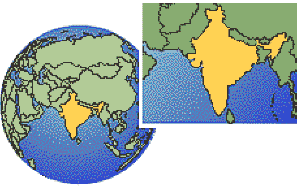The Geert Hofstede analysis for India shows a large power distance
society and all other measures are relatively moderate.
This would be indicative of the fact that India is in the
midst
of change. The traditional caste systems has been outlawed,
however the large power distance score indicates that
the attitudes still remain.
India
has Power Distance (PDI) as the highest Hofstede
Dimension for the culture, with
a ranking of 77 compared to a world average of 56.5.
This Power Distance score for India indicates a high
level of
inequality of power and wealth within the society. This
condition is not necessarily subverted upon the population,
but rather accepted by the population as a cultural norm.
India's Long Term Orientation (LTO) Dimension rank
is 61, with the world average at 48. A higher LTO score
can be indicative of a culture that is perseverant
and parsimonious.
India has Masculinity as the third
highest ranking Hofstede Dimension at 56, with the
world average just slightly lower at 51. The higher
the country ranks in this Dimension, the greater
the gap between values of men and women. It may also
generate
a more competitive and assertive female population,
although still less than the male population.
India's lowest ranking Dimension is Uncertainty Avoidance
(UAI) at 40, compared to the world average of 65. On
the lower end of this ranking, the culture may be more
open to unstructured ideas and situations. The population
may have fewer rules and regulations with which to
attempt control of every unknown and unexpected event
or situation, as is the case in high Uncertainty Avoidance
countries.
India is predominantly Hindu, with 81% of
the population practicing that religion. Next is
Muslim at 12%, Christian at 2%, and all others within
the
last 5% of the society.
It
has been found that in most cultures, their is a
correlation between a country's religion and the
Hofstede Dimension rankings it has. There is only one
country with over 50% of its population practicing
the Hindu religion – India.
The Hofstede Dimension that correlates most with the
Hindu religion is Power Distance (PDI), the same as
Atheists in China and Muslims. All three have a high
level of Power Distance as the highest correlating
cultural Dimension with their religions. (See accompanying
article) See Geert Hofstede Details
Written
by Stephen Taylor - the Sigma
Two Group



